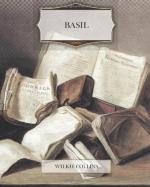Here the dream ended, and I awoke.
It was broad daylight. The sun shone brilliantly, the sky was cloudless. I looked at my watch; it had stopped. Shortly afterwards I heard the hall clock strike six.
My dream was vividly impressed on my memory, especially the latter part of it. Was it a warning of coming events, foreshadowed in the wild visions of sleep? But to what purpose could this dream, or indeed any dream, tend? Why had it remained incomplete, failing to show me the visionary consequences of my visionary actions? What superstition to ask! What a waste of attention to bestow it on such a trifle as a dream!
Still, this trifle had produced one abiding result. I knew it not then; but I know it now. As I looked out on the reviving, re-assuring sunlight, it was easy enough for me to dismiss as ridiculous from my mind, or rather from my conscience, the tendency to see in the two shadowy forms of my dream, the types of two real living beings, whose names almost trembled into utterance on my lips; but I could not also dismiss from my heart the love-images which that dream had set up there for the worship of the senses. Those results of the night still remained within me, growing and strengthening with every minute.
If I had been told beforehand how the mere sight of the morning would reanimate and embolden me, I should have scouted the prediction as too outrageous for consideration; yet so it was. The moody and boding reflections, the fear and struggle of the hours of darkness were gone with the daylight. The love-thoughts of Margaret alone remained, and now remained unquestioned and unopposed. Were my convictions of a few hours since, like the night-mists that fade before returning sunshine? I knew not. But I was young; and each new morning is as much the new life of youth, as the new life of Nature.
So I left my study and went out. Consequences might come how they would, and when they would; I thought of them no more. It seemed as if I had cast off every melancholy thought, in leaving my room; as if my heart had sprung up more elastic than ever, after the burden that had been laid on it during the night. Enjoyment for the present, hope for the future, and chance and fortune to trust in to the very last! This was my creed, as I walked into the street, determined to see Margaret again, and to tell her of my love before the day was out. In the exhilaration of the fresh air and the gay sunshine, I turned my steps towards Hollyoake Square, almost as light-hearted as a boy let loose from school, joyously repeating Shakespeare’s lines as I went:
“Hope is a lover’s
staff; walk hence with that,
And manage it against despairing thoughts.”




